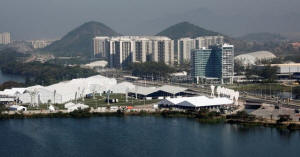|
"Morale is rock bottom," said one member of the National
Force, which is formed by police and fire services from states
across Brazil to provide security for major events and
emergencies.
National Force officers already in Rio - part of an overall
security deployment of 85,000 police, soldiers and other
personnel - form a relatively small part of the overall effort,
with about 5,000 members.
The officer, who asked not be named to avoid punishment by
superiors, said dozens of colleagues have decided to return to
their home states because of delayed pay and sparse conditions
in newly built public housing, some of it still lacking
furniture and other accommodations.
Their complaints add to security concerns ahead of the games. On
top of rising street violence and petty crime in Rio, a
transcript was made public in France on Wednesday in which a
French intelligence official said a Brazilian Islamist had been
plotting to attack the French Olympic delegation.
The Justice Ministry, which is responsible for the National
Force, said in a statement that pay and board for security
forces were guaranteed. It also said another 4,500 retired or
on-leave police officers could be called on if needed.
The National Force contingent is smaller than the 9,600 officers
originally expected.
The shortfall, a result of states not releasing more officers
from their local duties because of budget and security concerns
at a time when Brazil is struggling with recession, was filled
by the armed forces and a private security company.
Video footage broadcast on the Globo network showed members of
the National Force carrying mattresses and driving refrigerators
to their unfurnished lodgings.
"I'm having to sleep on the floor, our food arrives late and I
still haven't been paid," said the officer, explaining that his
first pay should have come earlier this month after 15 days of
service. "We're not being treated like professionals."
(Reporting by Stephen Eisenhammer; Editing by Steve Orlofsky)
[© 2016 Thomson Reuters. All rights
reserved.] Copyright 2016 Reuters. All rights reserved. This material may not be published,
broadcast, rewritten or redistributed.
 |
|






